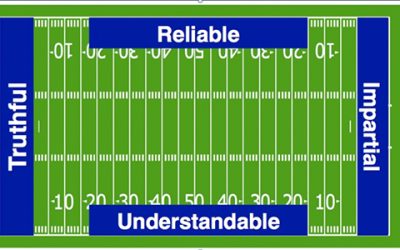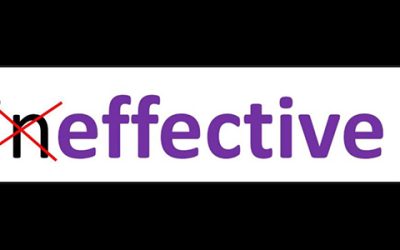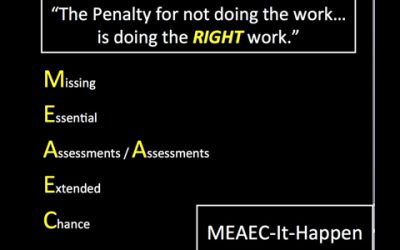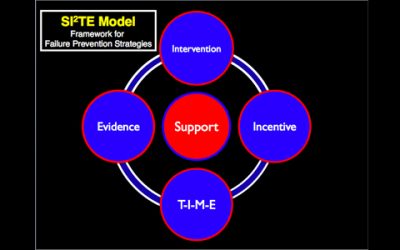Blog
Our ArticlesThe Four Core Grading Actions: Small Moves, Big Learning
If grading conversations in your PLC spiral into opinions and policy debates, you’re not alone. The antidote isn’t a 60-page handbook—it’s four repeatable actions that turn grades into guidance. Do these well and consistently, and student learning (and teacher...
Bringing Clarity to Grading: Turning Evaluation into Empowerment
“The art of teaching is clarity and the art of learning is to listen.” —Vandana Shiva Grades are meant to tell a story—a story about what students know, understand, and can do. Yet too often, they communicate confusion instead of clarity. When grades become mere...
When Grades Get in the Way (and How to Make Them Grow Learners)
A student gets an 86%. Another gets a 62%. Everyone nods, updates the gradebook, and moves on. But what, exactly, should those students do next? If your answer is, “I’m not sure,” you’re not alone. Most schools inherited grading habits that feel familiar but don’t...
The Case for Clarity of Scoring: Why Grading Practices Must Evolve to Support Student Learning
In classrooms across the country, grades carry significant weight—they determine advancement, influence college admissions, and communicate student achievement to parents and future educators. Yet, how those grades are determined often remains murky, inconsistent, and...
Grading That Grows Learners (Not Just Scores)
Picture two students leaving class with the same 82%. One shrugs—“good enough.” The other pauses and asks, “What does this tell me to do next?” Only one of them is becoming a visible learner. Visible learners can name what they’re learning, how they’ll know they’ve...
From Finality to Fluidity: Rethinking the Story Grades Tell
Every classroom tells a story. But too often, the story we tell through grades is one of finality — a full stop at the end of a learning cycle. The grade becomes the label, the verdict, the destination. Yet learning is not a destination. It’s a journey — dynamic,...
The Importance of Clarity in Grading
This article was originally posted on Corwin-Connect.com { See Original Article Here } When asked about their grades, students often respond, “I don’t know!”—not out of dishonesty, but due to a lack of clarity in grading. When you ask teachers what their biggest...
Three Actions to Successful and Deep PLC+ Implementation
This article was originally posted on Corwin-Connect.com { See Original Article Here } Schools and districts looking to implement initiatives like Professional Learning Communities (PLC+) must realize there isn’t one recipe for success. Successful implementation...
Three Reasons Activators are Crucial for Your PLC Success
This article was originally posted on Corwin-Connect.com { See Original Article Here } Picture this scenario: You have a PLC team that has every reason to be a success. The team is full of strong, passionate teachers committed to students’ learning. They have common...
Practice Trumps Policy (Part 2 of 4): Using Parameters to Drive Grading Decisions & Increasing Teachers Grading Playing Field
Practice Trumps Policy (Part 2 of 4): Using Parameters to Drive Grading Decisions & Increasing Teachers Grading Playing Field There are many conversations being started or continuing recently related to grades and grading practices: Teachers Throwing Out Grades,...
Practice Trumps Policy: (Part 1 of 4) Impeding Effective Formative Assessment
Effective Grading Lead by Realization That Practice Trumps Policy: Impeding Effective Formative Assessment Part 1 of 4 Many school & district leaders are putting a great deal of time, effort, & resources in attempts to drive changes in school & classroom...
Practical Failure Prevention Strategy–MEAEC-IT-Happen!!
Part 1: Practical Failure Prevention Grading Strategy Example: MEAEC-It-Happen! Ensuring ALL Student Work IS Essential As the new school year begins there are many possibilities for the coming year & few definitive truths. One truth is that students are going to...
Simple Strategy to Decrease Unnecessary Failure—Amnesty Days
Simple Strategy to Decrease Unnecessary Failure—Amnesty Days Have you ever had a traffic ticket, late credit card payment, or even an arrest record completely expunged and forgotten as if it didn’t happen? In a sense you were given Amnesty. The definition of amnesty...
Preventing Student Failure By MEAEC-it-Happen Part 2!
Part 2: Practical Failure Prevention Grading Strategy Example: MEAEC-It-Happen! Ensuring ALL Student Work IS Essential In my first post on the topic of using MEAEC-It-Happen as a failure prevention strategy aligned with the SI2TE Model , I highlighted the important...
Failure Prevention in Grading Actions — Using the SI2TE Model
A question I challenge secondary teachers and administrators with often: What would you rather put more effort into-Preventing student failures or enduring them. Many grading and feedback actions can drive student achievement and learning while actually increasing...















